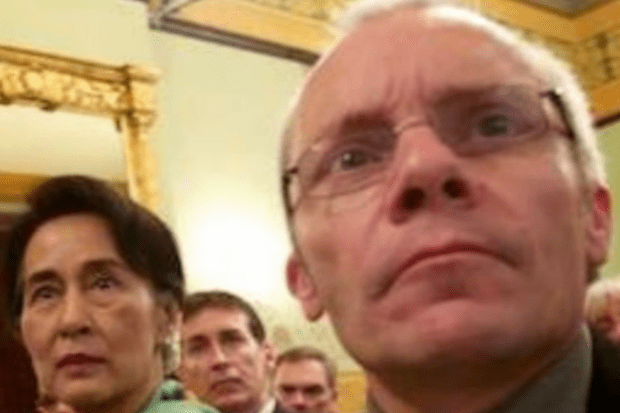Academics in Australia and beyond have expressed alarm at the detention of a Macquarie University economist who worked as a special economic consultant to Myanmar’s ousted leader, Aung San Suu Kyi.
Sean Turnell, research director of the Myanmar Development Institute economic thinktank in the country’s capital of Naypyitaw, was thought to be the first foreigner detained following the 1 February coup.
He was reportedly arrested five days later, when authorities stormed his Yangon hotel room while he was conducting a live interview with the BBC. “I’ve just been detained at the moment, and perhaps charged with something; I don’t know what that would be; could be anything at all of course,” he told the broadcaster.
It was believed that he was placed under house arrest in the hotel before being taken to a local police station for questioning. His last known contact was with a Reuters journalist the same day, when he said he was “fine and strong and not guilty of anything”.
In a tweet the day after the coup, Dr Turnell had thanked well-wishers for their messages of concern. “Safe for now but heartbroken for what all this means for the people of Myanmar. The bravest, kindest people I know. They deserve so much better,” he said.
The Australian government now faces another difficult task securing an academic’s freedom less than three months after it negotiated the release of University of Melbourne academic Kylie Moore-Gilbert from an Iranian prison.
In a statement, Australian foreign minister Marise Payne said the government was “deeply concerned” about arbitrary arrests of foreigners in Myanmar. “In particular, we have serious concerns about an Australian who has been detained at a police station,” she said.
She said the government had summoned the Myanmar ambassador to register its concern, and was trying to ascertain Australians’ safety “to the extent that communications allow”.
Ms Payne would not be drawn on the government’s next steps if Myanmar authorities did not comply with its demands to release Dr Turnell. She told the ABC that diplomats from Australia and elsewhere were struggling to obtain access to government representatives in Naypyitaw and nearby Yangon, in a “very volatile situation” where protests were being suppressed with water cannon.
The Guardian reported that Australian officials had been trying to reach Dr Turnell to whisk him out of the country when the Myanmar military seized him.
In a statement, Dr Turnell’s family said the Australian embassy in Yangon had “provided strong support to Sean in very challenging circumstances”.
The family was “distraught” at the ordeal that had befallen the “warm and kind-hearted” academic who had “fallen in love” with Myanmar. “Through working on and for it for more than two decades he brought jobs, investment and hope to many of the poorest people there without thought of reward or concern for his own advantage,” they said.
Australia’s academic union and UNSW Sydney economist Tim Harcourt are among many Australians who have posted messages of support. Professor Harcourt, who reportedly urged Dr Turnell to flee after the coup, described his friend as a “brilliant Aussie economist”.
Scottish educational psychologist and researcher James McTaggart tweeted that Dr Turnell had been arrested for the “crime” of assisting Myanmar’s transition to democracy and a fairer economy. “Many will suffer in this brutal coup to preserve military wealth and power,” he said.




